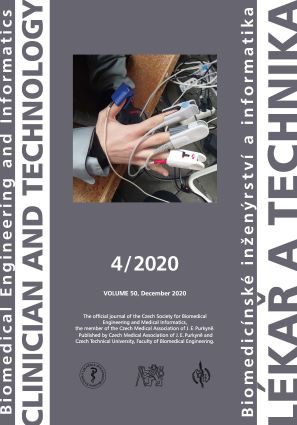FIRST EXPERIENCE WITH THE USE OF ICF CLASSIFICATION TO EVALUATE PATIENTS WITH PROGRESSIVE NEUROLOGICAL DISEASE IN RESEARCH
DOI:
https://doi.org/10.14311/CTJ.2020.4.02Abstract
Neurological conditions are associated with a high level of disability, which affects the overall quality of life of patients and their integration in society. As the disease progresses, self-sufficiency and mobility gradually deteriorate. These limitations are made easier by the use of appropriate compensatory aids and the modification of the environment. The sample included a total of 56 patients with neurological diseases—Multiple Sclerosis (41), Parkinson’s disease (14), and Amyotrophic Lateral Sclerosis (1). Women prevailed in the sample, accounting for 73%. The average age of the patients in the sample was 59.4, ranging from 38 to 81 years. Clinical forms of the ICF classification (International Classification of Functioning, Disability and Health) were used to record the information on the functional state of the patients. The most information was obtained from the ICF classification component Restrictions on Activities and Participation. The qualifiers of performance and capacity point out the supportive use of assistance (e.g. adjustment of the environment, compensatory aids) to improve the participation in patient’s life. Through a comprehensive evaluation of the patient's functional health using the ICF classification, we can obtain his/her functional profile. This information can be used when planning the nursing and rehabilitation care.
Downloads
Published
Issue
Section
License
Copyright (c) 2021 Jarmila Siverová, Radka Bužgová, Radka Kozáková

This work is licensed under a Creative Commons Attribution 4.0 International License.
Authors who publish with this journal agree to the following terms:
- Authors retain copyright and grant the journal right of the first publication with the work simultaneously licensed under a Creative Commons Attribution License (https://creativecommons.org/licenses/by/4.0/) that allows others to share the work with an acknowledgment of the work's authorship and initial publication in CTJ.
- Authors are able to enter into separate, additional contractual arrangements for the non-exclusive distribution of the journal’s published version of the work (e.g., post it to an institutional repository or publish it in a book), with an acknowledgment of its initial publication in this journal.
- Authors are permitted and encouraged to post their work online (e.g., in institutional repositories or on their website or ResearchGate) prior to and during the submission process, as it can lead to productive exchanges.
CTJ requires that all of the content of the manuscript has been created by its respective authors or that permission to use a copyrighted material has been obtained by the authors before submitting the manuscript to CTJ. CTJ requires that authors have not used any copyrighted material illegally, as for example a picture from another journal or book, a photo, etc. It is the author’s responsibility to use only materials not violating the copyright law. When in doubt, CTJ may ask the authors to supply the pertinent permission or agreement about the use of a copyrighted material.
The opinions expressed in CTJ articles are those of authors and do not necessarily reflect the views of the publishers or the Czech Society for Biomedical Engineering and Medical Informatics.


